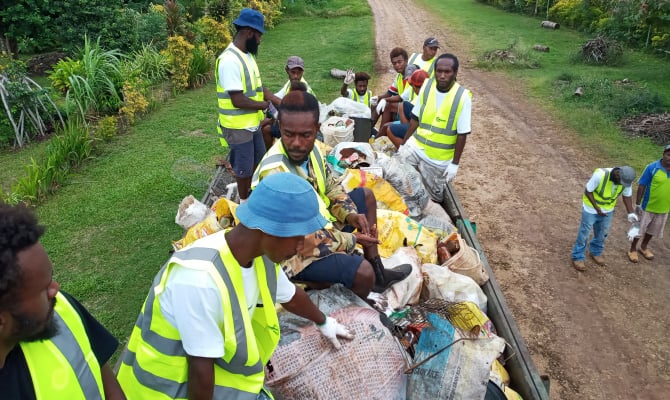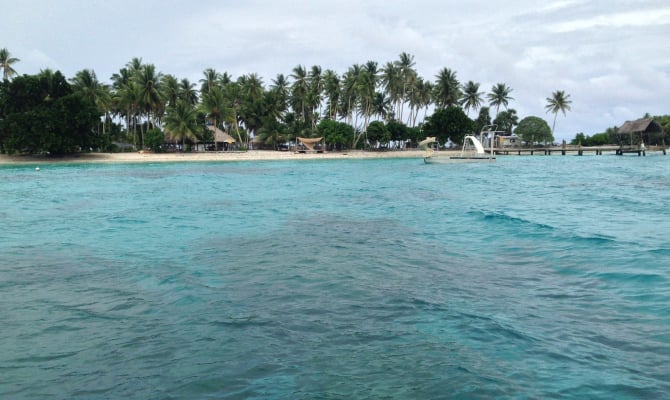Sustainable financing mechanisms intend to assist PICTs to generate the required income to effectively manage waste in the region
This coupled with the region’s sparse and geographically dispersed population creates challenges for adequate service provision for waste management, economies of scale to generate strong GDP and attract commodity sale markets.
As a result, packaging and end-of-life products remain in the region and are landfilled, stockpiled, or released to the environment creating pollution and environmental harm.
“We are proposing a common approach to establishing sustainable financing systems to assist PICTs to generate required income to effectively manage waste in the region”, said Anthony Talouli, Acting Director for SPREPs Waste Management and Pollution Control (WMPC) programme.
The intent of sustainable financing mechanisms for waste management, is to create an “Extended Producer Responsibility” framework where importers and in-country manufacturers share the management and cost burden for end-of-life products accepted by Pacific islands countries and territories.
“The purpose of these mechanisms is to determine the true cost of management, transport, and recovery/final disposal, and apply this fee to the importer/manufacturer”, added Talouli.
Talouli added that an additional ‘deposit’ would also be added to the sale of the product, which would then be used as an incentive for the consumer to return the product at the end of its life for recycling, and to redeem their deposit. This system is more commonly known as a ‘Container Deposit” system applied to beverage containers.
“Several donor funded projects are supporting the implementation of the Cleaner Pacific 2025 Strategy which includes the adoption of sustainable financing mechanisms to fund sound waste management activities”, further added Talouli.
Donor funded projects, managed by WMPC include the GEF ISLANDS Pacific Child Project which will be supporting several countries to complement sustainable financing initiatives that are being implemented under the European Union funded PacWastePlus programme and the Commitment to Sustainable Waste Actions in the Pacific (SWAP) Project, funded by l’Agence Française de Developpement (AFD).
“The GEF ISLANDS Pacific Child Project will develop and deliver a webinar series on advance disposal fee and undertake a feasibility study on the possibility of recycling end of life vehicles in the region through the various advance recovery fee initiatives that are being implemented”, said Talouli.
JICA’s Technical Cooperation Project J-PRISM II has been providing a number of technical support to the national level such as the enhancement of financial capacity of waste services, e.g., user-pay system to Samoa, Vanuatu, Tonga, Fiji, and Solomon Islands and the development and implementation of a Container Deposit System in RMI, FSM, Vanuatu, and Solomon Islands.
“The J-PRISM II project is assisting the peer-to-peer learning among member countries on financially sustainable waste management by actions such as the publishing of a guidebook and case studies of the Deposit-Refund System for Pacific island countries on experiences at the national level and delivering a virtual workshop on Economic Instruments and Finance in Waste Management to 9 countries” stated Talouli.
The PacWastePlus programme is providing a large range of programmatic support to the region to implement sustainable financing systems. Several activities which include undertaking a feasibility study of applicable products that could be included in an ‘Advance Recovery Fee & Deposit’ (ARFD) system, and initial assessment on the economics of system introduction into the Cook Islands, Kiribati, Nauru, Niue, Papua New Guinea, Republic of the Marshal Islands, Samoa, Solomon Islands and Vanuatu.
The programme will also investigate the provision of legislative support, facility/equipment procurement, system design and community awareness to assist system design and implementation and undertaking a feasibility study of applicable products that could be added to the existing ARFD system with provision of legislative support to assist system design and implementation.
“The PacWastePlus programme will be undertaking the development of regional tools and guidance based on the outcomes and learning from the national interventions described above and the development of a tool kit of guidance and resources to guide process development and community engagement”, said Talouli.
The SWAP Project will be addressing issue of sustainable financing through technical and financial support to Wallis and Futuna for the implementation of a sorting unit for waste collected under a “Container Deposit” system or a metal waste remelting facility.
The proposed pathway for sustainable financing mechanism outlines 21 priority steps around the topics of identification of the need for legislation, research, political will and support, preliminary systems concept, feasibility study, consultations, confirmation of sustainable finance system design, legal drafting, implementation, monitoring, evaluation and auditing.
It is envisaged that the Secretariat will assist Members implement as well as coordinate this Pathway through the Cleaner Pacific 2025 and capitalising on current donor funded projects such as the PacWastePlus Programme, GEF ISLANDS, SWAP and JPRISM II as well as any new projects that would be mobilised as part of the proposed pathway.
The 30th SPREP Meeting of Officials is being held virtually for participants from around the Pacific and face-to-face for participants in Samoa.
This story was produced by Leanne, published at SPREP on 9 September 2021, reposted via PACNEWS.



